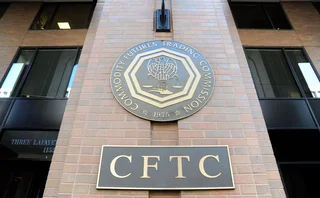On the Fence About Fintech Regulations
Differing sides of the financial technology regulation debate each make sense, which is why choosing a side is difficult.

Regulation has always been a hot topic, but lately it seems to be the only thing anyone talks about. Waters has been covering developments around this topic since it was founded more than 20 years ago—after all, this publication focuses on all technologies that capital markets firms use to support their operations. And so, by way of conversations with people in the industry, I thought I might be able to form an opinion on the matter. But I really can’t pick a side.
Emerging technologies like artificial intelligence and blockchain represent a whole new realm for many regulatory agencies. As these innovations change the way the financial industry functions, agencies like the Securities and Exchange Commission (SEC) must figure out how to fold these technologies into current policies—many of which were designed and implemented decades before the current wave of innovation. It’s been interesting to hear ideas about how to ensure that certain risks associated with developing, adopting and implementing new technologies are adequately mitigated.
Collaboration
Recently, I had the chance to listen to Beth Knickerbocker, chief innovation officer of the Office of the Comptroller of the Currency (OCC), speak about this very topic at an industry conference. She said the OCC is actively trying to work with fintech firms to understand emerging technologies and how these could be applied to the industry. “Regulation is not going anywhere and we have to act in a safe and sound manner,” Knickerbocker said, pointing out that the financial industry has a direct impact on the world’s economy.
Last year, the OCC announced that it would consider chartering financial technology companies as special-purpose national banks. The SEC also offered to work with firms while the Commodity Futures Trading Commission (CFTC) launched its own fintech initiative—LabCFTC—which includes an office that can guide new startups through its policies. Indeed, the CFTC’s approach to fintech, spearheaded by Chairman J. Christopher Giancarlo, is well-regarded in the wider industry.
But there are recurrent problems. Regulators, particularly the CFTC, prefer it when technologists practice what it calls “responsible innovation,” one of those terms crafted by career lawyers, and honestly, I’m not sure what it means. I’m not the only one.
Fintech firms often say they’re in favor of regulation, but that enthusiasm only stretches to the point where they’re told “no.” The favored protest to enhanced oversight, as many people have told me, is that innovation is hard to achieve when there are many rules governing it. Building something from scratch means having the courage to fail many times, and being able to tap into a larger world of ideas without getting bogged down by practicality.
On the one hand, these development concerns are valid. After all, it is hard to bring something back to Earth when it was built to go beyond it. But I also believe that innovation can happen if developers are forced to think inside the box as well, to see how they can work out a problem from within the confines of a regulated entity.
On the other hand, the rules for an entire industry can’t just change because someone is convinced their product needs them to, and the financial markets are not a videogame—as per Knickerbocker’s point, they have an impact on everyone’s lives. Regulations are important to protect people and investors, and to ensure stable markets. Fintech is not without its share of predators, as recent SEC and CFTC enforcement actions around digital currencies have shown.
I don’t know if regulatory agencies can realistically design, let alone enforce, any rules they come up with around financial technology. But I am a firm believer in sunlight being the best disinfectant.
Regulation may be uncomfortable, and at times prohibitive, but what I do know for sure is that there is a need to continue having this discussion, so that all the issues are brought to light. It can only make the industry, the regulators and the new technologies that much better. Just don’t ask me to pick a side.
Only users who have a paid subscription or are part of a corporate subscription are able to print or copy content.
To access these options, along with all other subscription benefits, please contact info@waterstechnology.com or view our subscription options here: http://subscriptions.waterstechnology.com/subscribe
You are currently unable to print this content. Please contact info@waterstechnology.com to find out more.
You are currently unable to copy this content. Please contact info@waterstechnology.com to find out more.
Copyright Infopro Digital Limited. All rights reserved.
As outlined in our terms and conditions, https://www.infopro-digital.com/terms-and-conditions/subscriptions/ (point 2.4), printing is limited to a single copy.
If you would like to purchase additional rights please email info@waterstechnology.com
Copyright Infopro Digital Limited. All rights reserved.
You may share this content using our article tools. As outlined in our terms and conditions, https://www.infopro-digital.com/terms-and-conditions/subscriptions/ (clause 2.4), an Authorised User may only make one copy of the materials for their own personal use. You must also comply with the restrictions in clause 2.5.
If you would like to purchase additional rights please email info@waterstechnology.com
More on Regulation
Regulators can’t dodge DOGE, but can they still get by?
The Waters Wrap: With Trump and DOGE nipping at regulators’ heels, what might become of the CAT, the FDTA, or vendor-operated SEFs?
CFTC takes red pen to swaps rules, but don’t call it a rollback
Lawyers and ex-regs say agency is fine-tuning and clarifying regulations, not eliminating them.
The European T+1 effect on Asia
T+1 is coming in Europe, and Asian firms should assess impacts and begin preparations now, says the DTCC’s Val Wotton.
FCA sets up shop in US, asset managers collab, M&A heats up, and more
The Waters Cooler: Nasdaq and Bruce ATS partner for overnight market data, Osttra gets sold to KKR, and the SEC takes on DOGE in this week’s news roundup.
Waters Wavelength Ep. 312: Jibber-jabber
Tony, Reb, and Nyela talk about tariffs (not really), journalism (sorta), and pop culture (mostly).
Experts say HKEX’s plan for T+1 in 2025 is ‘sensible’
The exchange will continue providing core post-trade processing through CCASS but will engage with market participants on the service’s future as HKEX rolls out new OCP features.
No, no, no, and no: Overnight trading fails in SIP votes
The CTA and UTP operating committees voted yesterday on proposals from US exchanges to expand their trading hours and could not reach unanimous consensus.
Big xyt exploring bid to provide EU equities CT
So far, only one group, a consortium of the major European exchanges, has formally kept its hat in the ring to provide Europe’s consolidated tape for equities.







